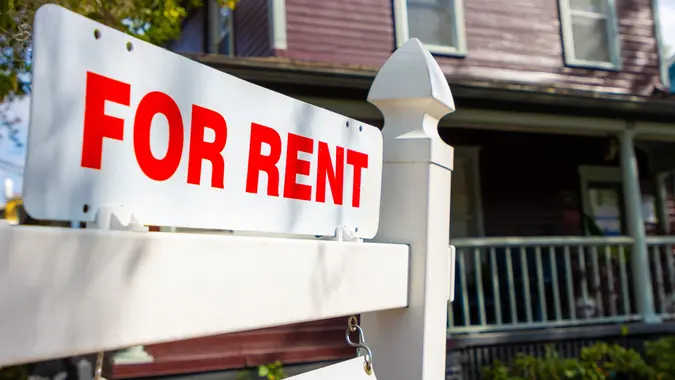5 Key Signs You’re Overspending on Rent and What To Do About It

Commitment to Our Readers
GOBankingRates' editorial team is committed to bringing you unbiased reviews and information. We use data-driven methodologies to evaluate financial products and services - our reviews and ratings are not influenced by advertisers. You can read more about our editorial guidelines and our products and services review methodology.

20 Years
Helping You Live Richer

Reviewed
by Experts

Trusted by
Millions of Readers
Paying rent or a mortgage is part of adult life, but that doesn’t mean the amount should go unquestioned. What seems manageable on paper might still be more than what makes sense to pay due to factors like hidden fees, poor property condition or a higher price than similar units nearby. Below are five signs you’re paying more rent than you should and what to do about it.
Also here are signs you are paying too much on household expenses.
Comparable Listings Have Lower Rent
“If you live in an apartment complex or building, visit the property’s website to compare current availabilities,” said Rany Burstein, CEO and founder of Diggz, a roommate and rental search platform.
“Units with similar layouts, floor levels and features can reveal whether you’re paying above market rate. Also see if they are giving any promotions like a free month to new residents (but keeping the advertised rent same or higher than yours),” Burstein explained.
“Zillow, Rent.com and Diggz are great for researching comparable listings in your area,” Burstein added. “For renters living with roommates, Diggz offers insights into what room rentals are going for in your neighborhood.”
You Estimate the Landlord’s Mortgage Costs Are Much Lower
“If you’re renting from a private landlord, you can get creative,” Burstein said. “If the property is privately owned, you can often find out when it was purchased and for how much. Based on that, you can roughly estimate what their mortgage cost is.”
Burstein explained that doing this can give you insight into your landlord’s margins and whether there’s room to negotiate.
“I did this during the pandemic when my landlord refused to lower my rent,” he said. “I figured out their monthly cost and offered to at least cover that. I saved $800 on my monthly rent and the landlord knew that at least he wouldn’t be paying out of pocket on his place during the pandemic.”
Your Rent Exceeds the 30% Rule
Ryan Nelson, founder of Property Build, said that a common financial guideline is rent should account for no more than 30% of your gross monthly income.
“If your rent exceeds this percentage, it’s a strong indicator that you’re spending too much and may need to explore other options,” he added.
Hidden Fees Are Upping the Rent
“Sometimes extra costs like maintenance fees, utilities or parking can inflate your total expenses,” Nelson said. “Review your lease carefully to understand what additional charges may be contributing to high rent.”
The Amenities and Condition of the Property Are Lacking
Nelson also pointed out that if where you live lacks essential amenities or is in poor condition, you’re likely overpaying. “Compare your current property’s value to others in your neighborhood,” he said.
What To Do If Your Rent Is Too High
Here are some suggestions if you’re dealing with rent that’s too high.
Ask for Concessions To Reduce Upfront Costs
Burstein said landlords may be willing to offer a free month — especially during slow seasons — or reduce the security deposit. “Services like Rhino allow renters to pay a small monthly fee instead of a large deposit,” he added.
Negotiate Upfront Payment Terms
“If your landlord requires first, last and security upfront, ask to use the ‘last month’ payment earlier in the lease or apply the security deposit toward your final month,” he said. “This doesn’t reduce your overall rent but can improve your cash flow.”
Sign a Longer Lease
“I once negotiated a 14-month lease instead of a 12-month lease during the off-season, saving me $3,000,” Burstein said. “Offering to sign a longer lease during the landlord’s slow season can increase your leverage.”
Leverage Payment History or Previous Issues
Burstein explained that you can leverage your payment history or previous inconveniences — like building renovations or heating issues — as a reason to negotiate a rent reduction or at least avoid an increase. He also pointed out that if there are multiple vacancies in your building, it will give you even stronger leverage.
Time Your Negotiation Wisely
“Don’t reveal your intentions too early,” Burstein said. “Landlords may pressure you to confirm your renewal plans months in advance. Delaying this conversation until closer to your lease end can give you more negotiating power since they’ll have less time to find a replacement.”
Be Willing To Move
Burstein said that once he moved out of a building that was offering new tenants two months’ free rent but wouldn’t budge on the price of his rent when his lease was up.
“I bluffed that I won’t renew thinking they’d cave,” he said. “Ultimately, they rented my apartment without even showing it. I had to move last minute, but I put my stuff in storage, subleased a place for two months and then returned to my previous building and got the two-month free and lower rent. It was definitely a lot of stress and hassle, but I saved a lot. But the moral is, don’t get too attached to a place you rent. Renting allows you to be flexible and adaptable to market changes and personal needs. Embrace it.”
Consult With a Real Estate Expert
Nelson said to consult with a real estate professional who can provide valuable insights on rental trends, property values and alternative options. “Seeking expert advice may help you make informed decisions that align with your budget and lifestyle,” he added.
 Written by
Written by  Edited by
Edited by 
























